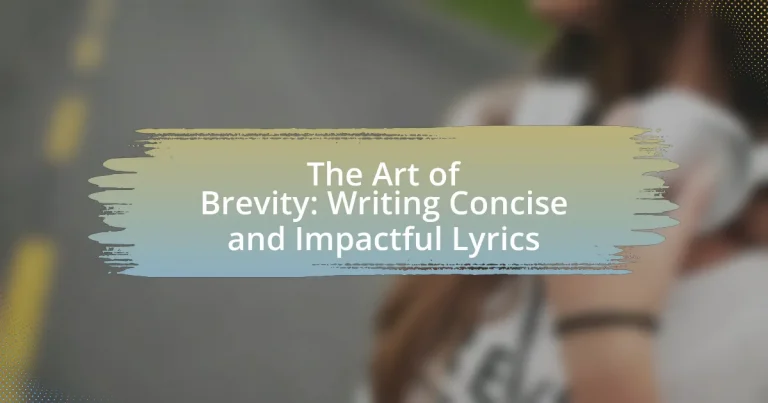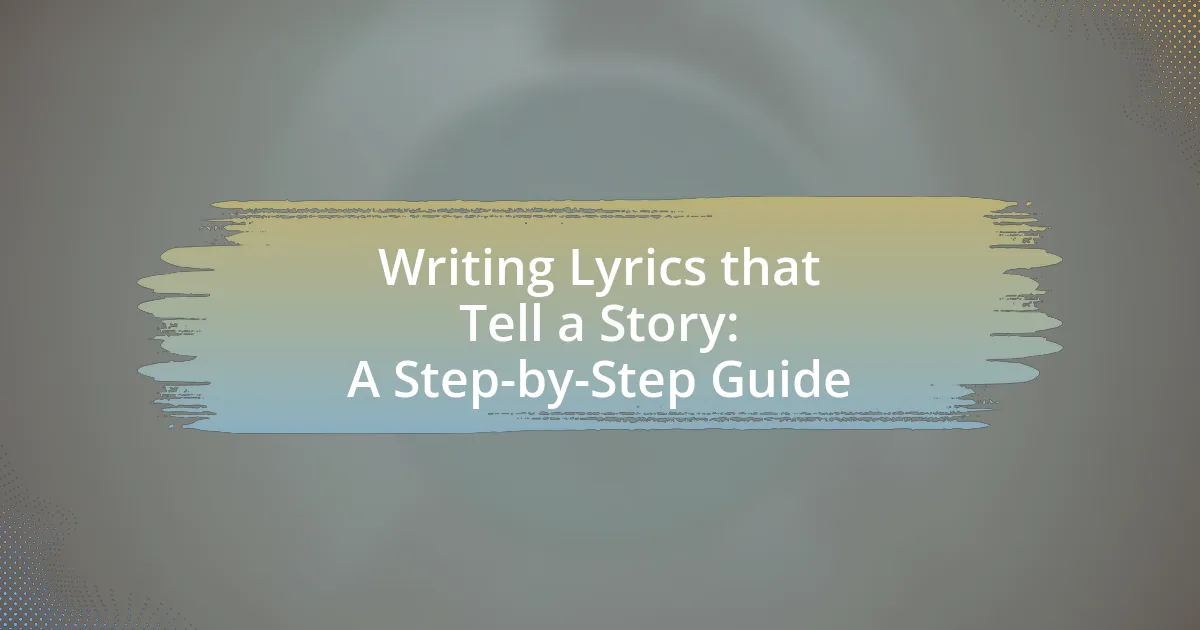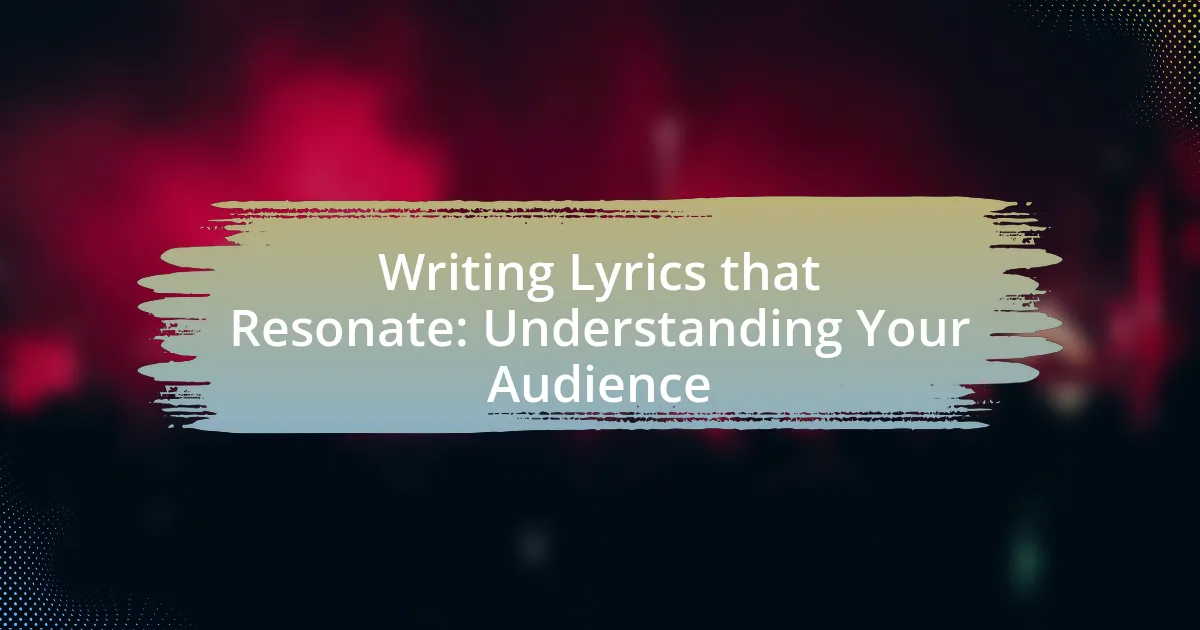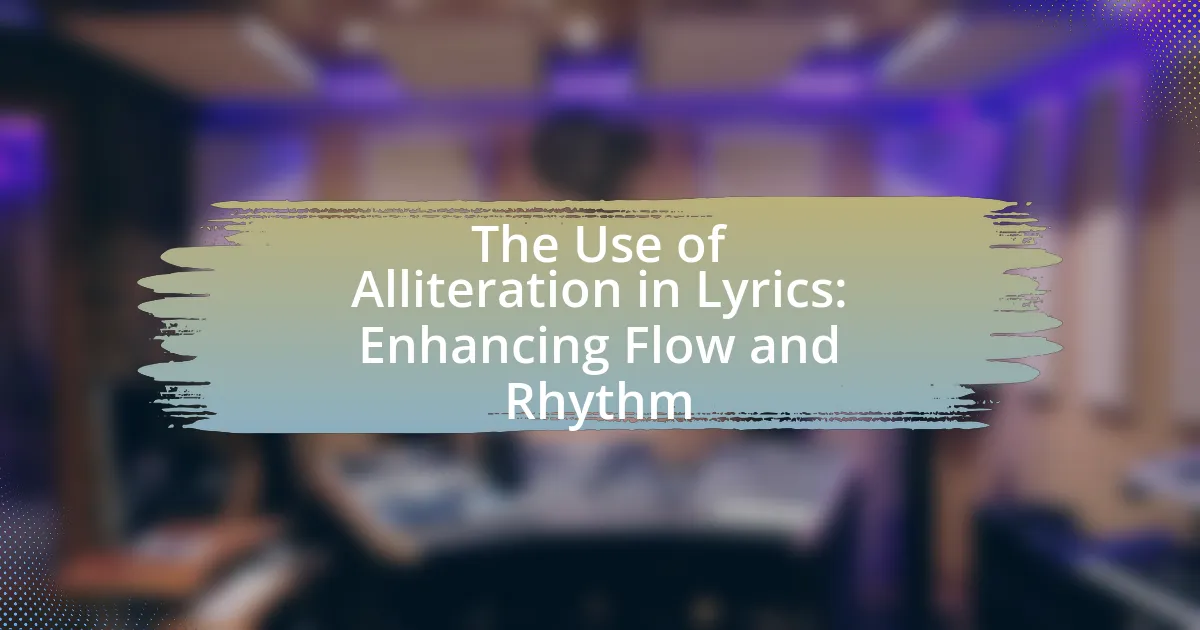The Art of Brevity in Lyrics emphasizes the skill of expressing deep emotions and ideas with minimal words, enhancing the emotional impact and clarity of songwriting. This article explores the significance of brevity in lyrics, highlighting its role in listener engagement and retention. It discusses key principles for writing concise lyrics, including clarity, strong word choice, and effective structure, while also addressing common challenges such as perfectionism and cognitive overload. Techniques for achieving brevity, such as using imagery and eliminating filler words, are examined, along with strategies for maintaining emotional resonance in concise writing.

What is The Art of Brevity in Lyrics?
The Art of Brevity in Lyrics refers to the skill of conveying profound emotions and ideas using minimal words. This technique enhances the impact of lyrics by focusing on essential phrases that resonate with listeners, allowing for deeper emotional connections. For example, many successful songwriters, such as Bob Dylan and Taylor Swift, utilize brevity to create memorable lines that evoke strong imagery and feelings, demonstrating that less can often be more in lyrical composition.
Why is brevity important in songwriting?
Brevity is important in songwriting because it enhances clarity and emotional impact. Concise lyrics allow listeners to grasp the message quickly, making the song more memorable. Research indicates that songs with shorter, more focused lyrics tend to have higher engagement rates, as they resonate better with audiences who often prefer straightforward communication. For example, hit songs frequently utilize simple, direct language to convey complex emotions, demonstrating that brevity can lead to greater listener connection and retention.
How does brevity enhance the emotional impact of lyrics?
Brevity enhances the emotional impact of lyrics by distilling complex feelings into concise expressions that resonate deeply with listeners. When lyrics are succinct, they eliminate unnecessary words, allowing the core emotions to shine through more clearly. This directness often evokes stronger reactions, as seen in popular songs where a few powerful lines can convey profound sentiments, such as heartbreak or joy. For example, the song “Hurt” by Nine Inch Nails, later covered by Johnny Cash, uses minimalistic lyrics to evoke intense feelings of despair and regret, demonstrating how brevity can amplify emotional depth.
What are the risks of overly verbose lyrics?
Overly verbose lyrics can dilute the emotional impact of a song and lead to listener disengagement. When lyrics are excessively wordy, they may obscure the core message, making it difficult for the audience to connect with the song’s themes. Research indicates that concise lyrics often resonate more effectively with listeners, as they allow for clearer communication of emotions and ideas. For instance, a study published in the Journal of Popular Music Studies found that songs with succinct lyrics tend to achieve higher listener retention and engagement rates compared to those with lengthy, complex verses. Thus, verbosity in lyrics poses a risk of losing the audience’s attention and undermining the song’s overall effectiveness.
What are the key principles of writing concise lyrics?
The key principles of writing concise lyrics include clarity, brevity, and emotional impact. Clarity ensures that the message is easily understood, allowing listeners to connect with the song. Brevity involves using fewer words to convey the same meaning, which enhances memorability and engagement. Emotional impact is achieved by selecting powerful words that evoke feelings, making the lyrics resonate with the audience. These principles are supported by successful songwriters who often emphasize the importance of editing and refining lyrics to maintain focus and intensity, as seen in the works of artists like Bob Dylan and Taylor Swift, who are known for their impactful yet succinct lyricism.
How can word choice affect lyric brevity?
Word choice significantly impacts lyric brevity by determining the number of syllables and the overall clarity of the message. Selecting concise, vivid words allows songwriters to convey emotions and ideas more efficiently, reducing the need for additional lines or phrases. For instance, using “love” instead of “affection” or “adore” can save syllables while maintaining meaning, thus enhancing the song’s rhythmic flow. Studies in songwriting emphasize that brevity often leads to stronger emotional resonance, as listeners can grasp the essence of the lyrics quickly, making the song more memorable.
What role does structure play in concise songwriting?
Structure is essential in concise songwriting as it provides a framework that organizes ideas and enhances clarity. A well-defined structure, such as verse-chorus-verse, allows songwriters to present their message succinctly while maintaining listener engagement. For instance, the use of repetition in choruses reinforces key themes, making them memorable and impactful. Additionally, studies show that songs with clear structural elements tend to resonate more with audiences, as they facilitate emotional connection and comprehension. Thus, effective structure not only aids in brevity but also amplifies the overall impact of the lyrics.
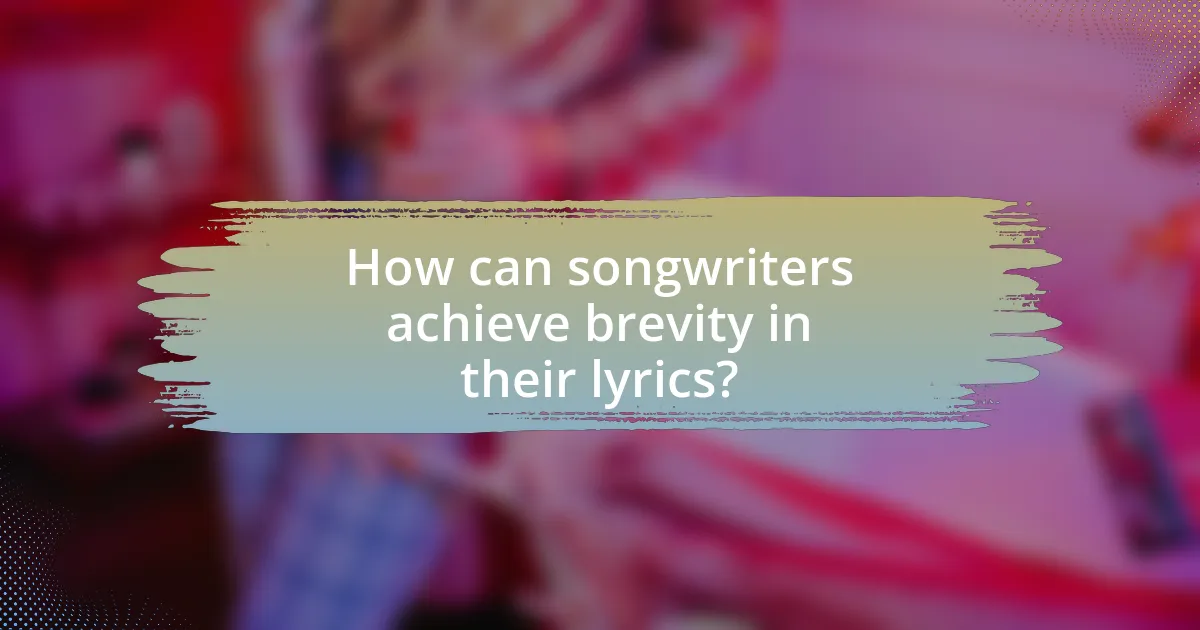
How can songwriters achieve brevity in their lyrics?
Songwriters can achieve brevity in their lyrics by focusing on clear and concise language that conveys emotion and meaning without unnecessary words. This involves selecting strong, evocative imagery and using simple, direct phrases that resonate with listeners. For instance, the use of metaphors and similes can encapsulate complex ideas in fewer words, enhancing the lyrical impact. Additionally, songwriters can edit their work rigorously, removing redundant phrases and ensuring each line serves a purpose. Research indicates that songs with fewer words often have higher emotional engagement, as seen in studies analyzing popular music trends.
What techniques can be used to condense lyrics?
Techniques to condense lyrics include using imagery, employing metaphors, and focusing on core themes. Imagery allows for the expression of complex ideas through vivid descriptions, enabling listeners to grasp emotions quickly. Metaphors can convey deeper meanings in fewer words, enhancing the lyrical impact. Focusing on core themes helps eliminate unnecessary details, ensuring that each line contributes to the overall message. These techniques are supported by the principle that concise language often resonates more powerfully with audiences, as seen in successful songwriting across various genres.
How does the use of imagery contribute to brevity?
The use of imagery contributes to brevity by allowing writers to convey complex ideas and emotions in fewer words. Imagery encapsulates vivid descriptions that evoke strong mental pictures, enabling the audience to grasp the intended message quickly. For instance, instead of elaborating on a scene with lengthy explanations, a single, well-chosen image can evoke the same feelings and context, thus reducing word count while maintaining impact. This efficiency in communication is essential in lyric writing, where every word counts, and the ability to create a strong emotional response with minimal language is crucial for effectiveness.
What are effective ways to eliminate filler words?
To eliminate filler words effectively, practice conscious speech and writing by pausing instead of using fillers. This technique allows for clearer communication and enhances the impact of your message. Research indicates that individuals who actively monitor their speech patterns can reduce filler word usage by up to 50% over time. Additionally, recording and reviewing your speech can help identify and address specific filler words, reinforcing awareness and promoting more concise expression.
How can songwriters maintain impact while being concise?
Songwriters can maintain impact while being concise by focusing on strong imagery and emotional resonance in their lyrics. By using vivid language and relatable themes, songwriters can evoke powerful feelings without lengthy explanations. For instance, the use of metaphors and similes can convey complex emotions succinctly, as seen in popular songs where a single line encapsulates a deep sentiment. This approach is supported by studies in songwriting that emphasize the effectiveness of brevity in capturing listeners’ attention and enhancing memorability, such as the research conducted by the University of Southern California, which found that concise lyrics often lead to higher engagement rates among audiences.
What strategies can enhance the emotional resonance of short lyrics?
To enhance the emotional resonance of short lyrics, writers can employ vivid imagery, personal experiences, and universal themes. Vivid imagery allows listeners to visualize emotions and situations, making the lyrics more relatable and impactful. Personal experiences infuse authenticity, as listeners connect with genuine feelings and stories. Universal themes, such as love, loss, and hope, resonate across diverse audiences, ensuring that the emotional core of the lyrics is widely understood. Research indicates that songs with relatable themes and strong imagery tend to evoke stronger emotional responses, as evidenced by studies in music psychology that show a correlation between lyrical content and listener engagement.
How can repetition be effectively used in concise lyrics?
Repetition can be effectively used in concise lyrics by emphasizing key themes and enhancing memorability. This technique allows songwriters to create a strong emotional impact while maintaining brevity. For instance, the chorus of a song often employs repetition to reinforce the central message, making it easier for listeners to remember and connect with the song. A notable example is the song “Hey Jude” by The Beatles, where the repeated phrase “na-na-na” serves to create a sing-along quality, enhancing listener engagement. This strategic use of repetition not only captures attention but also solidifies the song’s core message in the audience’s mind.
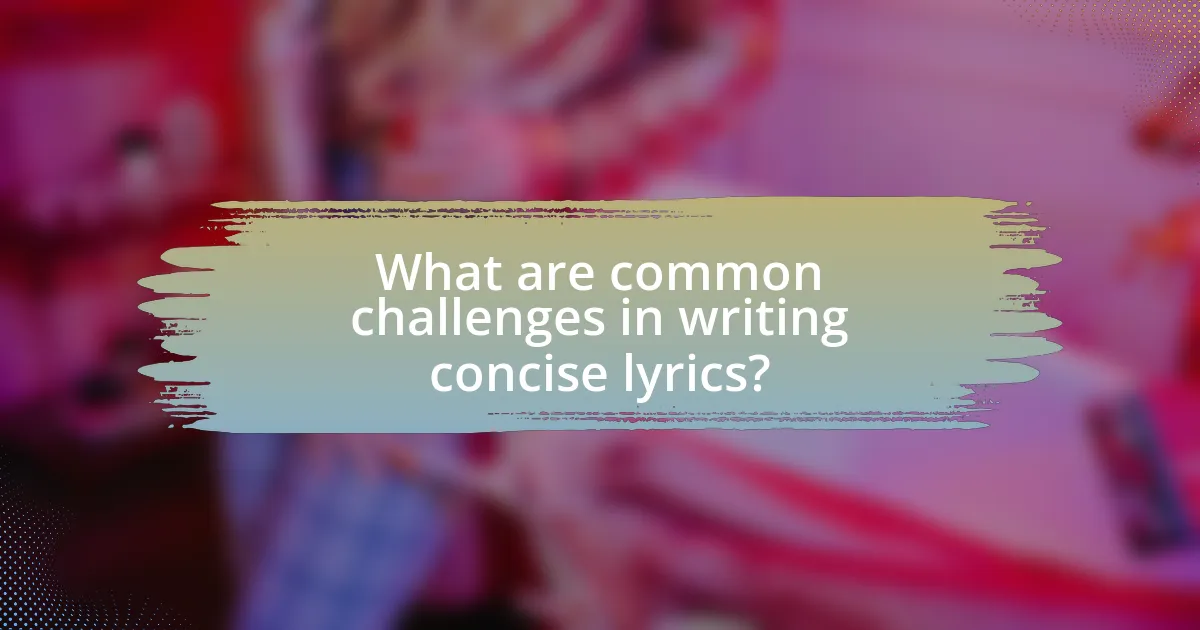
What are common challenges in writing concise lyrics?
Common challenges in writing concise lyrics include the difficulty of conveying complex emotions and ideas within a limited word count. Songwriters often struggle to balance brevity with depth, as they aim to express meaningful content without excessive elaboration. Additionally, finding the right words that fit both the rhythm and melody can complicate the process, leading to potential compromises in clarity or impact. The need to maintain a catchy hook while being succinct further adds to the challenge, as songwriters must ensure that their lyrics resonate with listeners while adhering to a concise format.
Why do songwriters struggle with brevity?
Songwriters struggle with brevity because they often aim to convey complex emotions and narratives within a limited structure. This challenge arises from the desire to create depth and resonance in their lyrics, which can lead to the inclusion of excessive detail or elaboration. Research indicates that effective songwriting requires balancing emotional expression with concise language, as seen in successful songs that often utilize simple yet powerful phrases. For instance, studies show that songs with fewer words can achieve greater emotional impact, highlighting the importance of brevity in lyricism.
What are the psychological barriers to writing concise lyrics?
The psychological barriers to writing concise lyrics include fear of vulnerability, perfectionism, and cognitive overload. Fear of vulnerability can prevent lyricists from expressing their true emotions succinctly, as they may worry about how their words will be perceived. Perfectionism often leads to overthinking, causing writers to struggle with brevity as they seek the “perfect” phrase. Cognitive overload occurs when the writer feels overwhelmed by ideas, making it difficult to distill thoughts into concise expressions. These barriers hinder the ability to create impactful lyrics that resonate with listeners.
How can perfectionism hinder the brevity of lyrics?
Perfectionism can hinder the brevity of lyrics by causing songwriters to overanalyze and excessively refine their words, leading to longer, more complex lines. This tendency to seek flawlessness often results in the inclusion of unnecessary details and embellishments, which detracts from the concise expression of ideas. Research indicates that perfectionism can lead to procrastination and diminished creativity, as artists may become fixated on achieving an ideal rather than focusing on effective communication. Consequently, the desire for perfection can obstruct the clarity and impact that brevity in lyrics typically provides.
What are the best practices for overcoming brevity challenges?
To overcome brevity challenges in writing concise and impactful lyrics, focus on clarity and precision in word choice. Utilizing strong, evocative language allows for the conveyance of deep emotions and ideas in fewer words. For instance, instead of using multiple adjectives to describe a feeling, select one powerful word that encapsulates the essence of that emotion. Additionally, employing imagery can create vivid mental pictures, allowing listeners to grasp complex concepts quickly. Research indicates that songs with concise lyrics often resonate more with audiences, as they are easier to remember and sing along to, enhancing their overall impact.
How can feedback from peers improve lyric conciseness?
Feedback from peers can improve lyric conciseness by providing diverse perspectives that highlight unnecessary words or phrases. When songwriters share their lyrics with others, peers can identify areas where the message may be diluted or overly complex, allowing the writer to refine their language. For instance, studies in collaborative writing show that peer reviews often lead to clearer and more direct communication, as seen in research by MacDonald and McCarthy (2018) in the Journal of Writing Research, which emphasizes the role of external input in enhancing clarity and brevity in written work. This collaborative process encourages lyricists to focus on essential ideas, ultimately resulting in more impactful and concise lyrics.
What exercises can help develop concise writing skills?
Exercises that can help develop concise writing skills include summarizing texts, practicing word limits, and revising sentences for clarity. Summarizing involves distilling longer pieces of writing into their essential points, which enhances the ability to identify key ideas. Practicing word limits, such as writing a complete thought in 50 words or less, forces writers to eliminate unnecessary words. Revising sentences for clarity involves identifying and removing redundant phrases, thereby improving overall conciseness. These exercises are effective because they train writers to focus on essential information and communicate it clearly.
What practical tips can help songwriters write impactful concise lyrics?
To write impactful concise lyrics, songwriters should focus on clarity, strong imagery, and emotional resonance. Clarity ensures that the message is easily understood, while strong imagery creates vivid mental pictures that engage listeners. Emotional resonance connects the audience to the song on a personal level, making the lyrics memorable.
Songwriters can achieve this by using specific and concrete language, avoiding vague terms. For example, instead of saying “feeling sad,” a songwriter might say “drowning in tears,” which paints a clearer picture. Additionally, limiting the number of words in each line can enhance the impact; studies show that songs with fewer words often resonate more with listeners.
Furthermore, revising lyrics multiple times helps to eliminate unnecessary words and refine the message. The practice of editing is supported by the principle that great writing often emerges from rewriting. By focusing on these strategies, songwriters can craft lyrics that are both concise and impactful.
